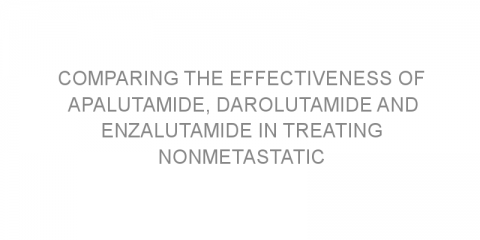In a nutshell The study compared outcomes of apalutamide (A; Erleada), darolutamide (D; Nubeqa), and enzalutamide (E; Xtandi) in treating nonmetastatic castration-resistant prostate cancer (nmCRPC). The authors found that A and E had better metastasis-free survival (MFS) compared to D. Some background Men with CRPC fail to respond to...
Read MoreConfined or spread disease-Confined to the prostate gland Posts on Medivizor
Evaluating the risk of secondary cancers after internal radiation therapy in patients with prostate cancer
In a nutshell This study looked at the long-term risk of secondary cancers following brachytherapy (BT; internal radiation therapy) for prostate cancer. It found that treating prostate cancer with BT had a low risk of secondary cancers. Some background Prostate cancer is a slow-growing cancer of the prostate gland. Men with prostate cancer that has...
Read MoreShould androgen-deprivation therapy be given at the same time or before radiotherapy in the treatment of localized prostate cancer?
In a nutshell The study looked at the sequence of dose-escalated radiotherapy (RT) and androgen-deprivation therapy (ADT) in the treatment of local prostate cancer (LPCa). The study found that treatment with ADT before RT had the same outcome as treatment with ADT and RT at the same time. Some background LPCa is a form of cancer that is...
Read MoreIs radiotherapy more effective with hormone therapy for patients with localized prostate cancer?
In a nutshell This study examined if brachytherapy, a type of radiotherapy, is more effective with or without hormonal therapy for patients with localized prostate cancer. The authors found that patients survived longer without cancer worsening after treatment with brachytherapy and hormonal therapy. Some background Brachytherapy (BT) is a type...
Read MoreThe use of relugolix in addition to radiotherapy in patients with prostate cancer
In a nutshell The study investigated the use of relugolix (Relumina), a hormonal therapy drug, in addition to radiotherapy (RT), in managing prostate cancer. The study found that relugolix was effective in reducing androgen (male sex hormones such as testosterone) levels and well tolerated in these patients. Some background Prostate...
Read MoreHow long should hormonal treatment be given to patients with locally advanced prostate cancer?
In a nutshell This study compared 6-month and 18-month courses of hormonal anti-androgen treatment and radiotherapy (RT) in patients with locally advanced prostate cancer (LAPC). The results showed that 18-month treatment was most effective, especially when used with high dose brachytherapy RT. Some background Androgens (such as testosterone) are...
Read MoreDoes surgical treatment of early prostate cancer reduce mortality in the long run compared to watchful waiting?
In a nutshell The study compared the long-term outcomes of prostate surgery (radical prostatectomy; RP) and observation (watchful waiting; WW) in patients with early prostate cancer. The study showed that surgery reduced mortality in these patients. Some background Prostate cancer is one of the most common cancers in American men....
Read MoreReviewing treatment options for patients with high-risk prostate cancer
In a nutshell This article reviewed treatment options for patients with high-risk prostate cancer. Some background Prostate cancer is a cancer that starts in the prostate gland. There are different types of treatment for patients with prostate cancer. Treatment choice depends on disease stage or whether the cancer has spread to other parts of the...
Read MoreSearching for patients to try a radiation treatment strategy for prostate cancer.
In a nutshell This trial is examining the effectiveness of ultra-high-dose hypofractionated or single-dose radiotherapy for intermediate (medium) risk prostate cancer. The main outcome that will be measured will be the number of patients that experience side effects. This study is being conducted in New York City, NY, the US. The details...
Read MoreWhat are the effects of radical prostatectomy without pelvic lymph node dissection in prostate cancer?
In a nutshell This study investigated the outcomes of radical prostatectomy (RP) without pelvic lymph node dissection (PLND) in patients with prostate cancer. The main finding was that 5 years after treatment, 100% of patients at low risk for cancer recurrence had survived. Some background PLND is surgery to remove the lymph nodes from the pelvis....
Read MoreEvaluating different radiotherapy doses for patients with prostate cancer
In a nutshell This study evaluated whether fewer sessions of radiotherapy at a higher dose was more effective than conventional radiotherapy for patients with prostate cancer. The authors found that fewer radiation sessions at a higher dose did not increase side effects. Some background Radiation therapy is an effective treatment for prostate...
Read MoreFocal high-intensity focussed ultrasound for the treatment of localized prostate cancer
In a nutshell This study aimed to evaluate the use of high-intensity focal ultrasound (HIFU) for the treatment of localized prostate cancer. This study found that HIFU is a safe treatment with good oncological results and minimal side-effects. Some background High-intensity focused ultrasound (HIFU) is a non-invasive technique that uses...
Read More













